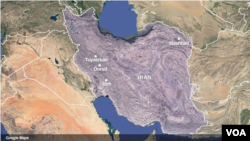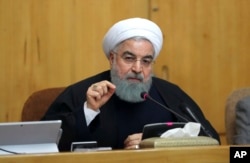Iranian state television says 12 people were killed overnight during anti-government protests, with President Hassan Rouhani vowing security forces would "respond to rioters and lawbreakers."
Hundreds of demonstrators have been arrested since protests broke out last week against economic conditions in the country and the government's military ventures in Syria, Iraq and Yemen as part of a battle with Saudi Arabia for influence in the region.
State TV said, "Some armed protesters tried to take control of some police stations and military bases, but they met strong resistance from security forces."
Rouhani declared, "The government will show no tolerance for those who damage public properties, violate public order and create unrest in the society."
New protests broke out as night fell on New Year's Day in Tehran, the Iranian capital, with images of burning cars shown on local media.
In a speech to parliamentary leaders, Rouhani lashed out at foreign countries, including the United States, Israel and especially Saudi Arabia, for allegedly fomenting unrest in Iran.
"Our progress and success in the world of politics and against the U.S. and the Zionist regime was not bearable to them," he said, while singling out Riyadh for "blatantly" saying it "will create problems in Tehran."
But U.S. President Donald Trump rebuffed the Iranian leader's remarks, saying in a New Year's Day Twitter comment that it was "time for change" in Iran.
"Iran is failing at every level, despite the terrible deal made with them by the Obama Administration," Trump said, referring to the 2015 international deal to curb Tehran's nuclear development program in exchange for easing economic sanctions against Tehran. "The great Iranian people have been repressed for many years. They are hungry for food & for freedom. Along with human rights, the wealth of Iran is being looted."
Israeli Prime Minister Benjamin Netanyahu called the protesters "brave" and "heroic," while wishing them "success in their noble quest for freedom."
Demonstrations erupted first last Thursday in Mashhad, Iran's second largest city, and then spread to other parts of the country.
Rouhani minimized the unrest, saying, "This is nothing."
He said, "Criticism and protest are an opportunity not a threat. Our nation will deal with this minority who chant slogans against the law and people's wishes, and insult the sanctities and values of the revolution. The people are absolutely free in expressing their criticisms and even protests. But criticism is different to violence and destroying public property."
The Trump administration says it is "very concerned" about Tehran blocking Iranians from communicating via social media platforms in a bid to dampen the protests.
Iran blocked access to messaging app Telegram and photo-sharing app Instagram on Sunday, with state media saying the moves were meant to maintain peace. Iranians had been using the apps to communicate about the street demonstrations, the biggest outpouring of public discontent with Iran's clerical leaders since 2009 protests against the results of a disputed presidential election.
In an interview with VOA's Persian Service on Sunday, Michael Anton, deputy assistant to the president for strategic communications, said there is not much the U.S. government can do about Iran's social media clampdown. But he said the Trump administration expects the United States and other Western companies to halt any concessions to the Iranian government.
"[They should] not bow to any demands for censorship or curtailment of information," Anton said. "[They should] continue doing business the way they always have, and let information flow freely into Iran." He added that U.S. officials will be watching how those companies handle the issue.
Telegram in particular is very popular in Iran, with more than 50 percent of the country's 80 million population said to be active on the app.
Telegram CEO Pavel Durov, a Russian entrepreneur whose company has offices in London, posted a tweet on Sunday, saying Iran had blocked access to the service after his refusal to shut down communication channels that he said were being used for peaceful protests.
In an online statement, Durov said it is unclear if the blocking of Telegram will be permanent or temporary. He said Telegram would "rather get blocked in a country by its authorities than limit peaceful expression of alternative opinions."
This report was produced in collaboration with VOA Persian.








